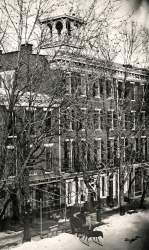Record Data
Source citation
Civic Club of Carlisle, Pennsylvania, Carlisle, Old and New (Harrisburg, PA: J. Horace McFarland Company, 1907), 54-60.
Type
Book
Date Certainty
Exact
Transcriber
John Osborne
Transcription date
Transcription
The following text is presented here in complete form, as it originally appeared in print. Spelling and typographical errors have been preserved as in the original.
On the morning of that never-to-be-forgotten Saturday, June 27, '63, a lieutenant in the Union cavalry rode into town and dismounted at the Mansion House.
"Why are you fellows falling back?" was asked by one of the citizens.
"Lee's army is about to pay you a visit; his advance is just out yonder," was the reply.
"I will bet fifty dollars there isn't a rebel north of the Potomac."
"Keep your cash and your confidence, for you may need both."
A few hours later four hundred Confederate cavalry under General Jenkins entered town and immediately demanded fifteen hundred rations. In less than an hour the stalls of the market house were richly stored, and man and beast were fed and filled. Now the strains of "Dixie" were heard, and looking out Pitt street, to the Walnut Bottom road, one saw nothing but marching men. On they came, many ragged, shoeless, hatless, and all begrimed and bedraggled by the twenty-mile march covered that June day. Little they looked like "the flower of the southern army!" Shoulder to shoulder with many a master in these ranks marched his negro servant, ready to share whatever the fortune of war might bring. General Ewell, who before the war had been stationed at the barracks, entered at the head of these troops and occupied the town. Fortunately Carlisle still held her niche in his heart, and this affection now stood the imperiled town in good stead, though his demand for supplies was too extravagant to be complied with. No violence or outrage was permitted, no buildings were destroyed, and after his departure scarcely a sign of occupation by a hostile force remained. Many of the soldiers, too, had been Dickinson students before the war. These took pleasure in renewing old friendships and in repaying old favors. At one prominent home the family had retired that anxious Saturday night, only to be aroused by a ring at the bell. On asking who wished entrance and receiving a well-known name in reply, the ladies timidly said, ''Do you come as friend or as foe?" "Always as friend to this house," was the quick response.
Two churches on the following morning opened their doors alike to the Blue and the Gray -- the Second Presbyterian and the First Lutheran. As word had been passed through town that the stores and shops would be searched at this time, it is not strange that most of the accustomed worshipers were obeying elsewhere the command, ''Watch." Dr. Fry, the Lutheran pastor, chose as his Scripture lesson the One Hundred and Thirty-ninth Psalm. When too late to retract, he remembered that it contains the command, '' Depart from me, therefore, ye bloody men." As over half of the sixty present were Confederate officers, he politely refrained from giving the words a personal touch, passing over them as lightly as possible. On the campus, where troops were quartered, and at the garrison,, services were held by the chaplains in charge.
The following day escape from town was rendered still more difficult by the destruction of the railroad bridge, east of the Square. Fires were made of the ties, and the rails, heated and softened in these, were twisted around the telegraph poles. Grim jokes enlivened the work. "You Yanks wanted us back in the Union pretty badly. Well, here we are. How do you like it?"
Tuesday morning music sweeter than any the town had ever heard, sounded through the air. "Away down South in Dixie Land, Away, Away,"-- soldier feet were keeping step to the notes, while from the barracks and from the college campus, over the Square, out of the town passed the invading troops. Hour after hour went by and still sounded the tread of marching feet. Tramping horses and rumbling wagons furnished a deep, strange accompaniment for the notes of fife and drum. "Oh, my darling Nellie Gray, they have taken her away,"-- many a soldier boy then marched to the familiar strain who a little later was lying stark on Gettysburg's field. "Maryland, My Maryland" and "The Old Kentucky Shore" wait in vain for their return.
At last the old Square breathed freely once again.


